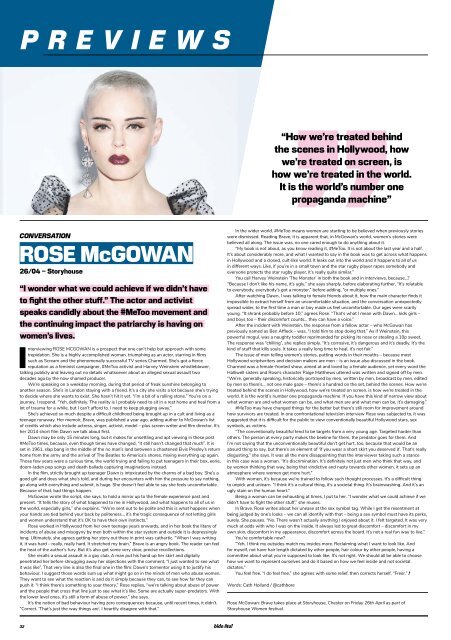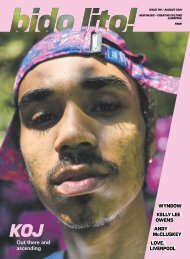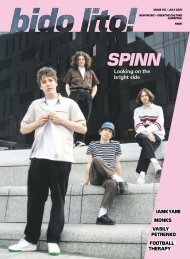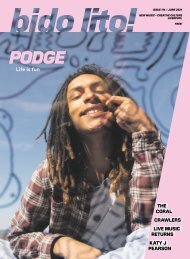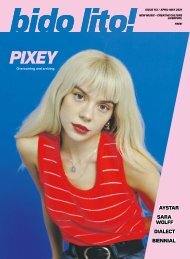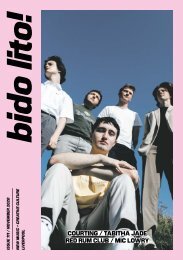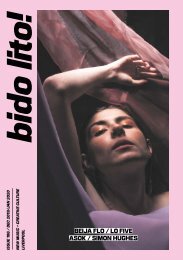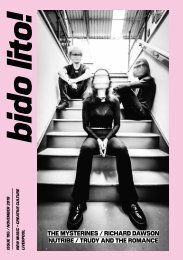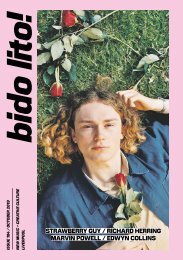Issue 98 / April 2019
April 2019 issue of Bido Lito! magazine. Featuring: XAMVOLO, YAMMERER, THE ZUTONS, MC NELSON, ROSE MCGOWAN, CITY OF LIVERPOOL FC, SLEAFORD MODS, SNAPPED ANKLES and much more.
April 2019 issue of Bido Lito! magazine. Featuring: XAMVOLO, YAMMERER, THE ZUTONS, MC NELSON, ROSE MCGOWAN, CITY OF LIVERPOOL FC, SLEAFORD MODS, SNAPPED ANKLES and much more.
You also want an ePaper? Increase the reach of your titles
YUMPU automatically turns print PDFs into web optimized ePapers that Google loves.
PREVIEWS<br />
“How we’re treated behind<br />
the scenes in Hollywood, how<br />
we’re treated on screen, is<br />
how we’re treated in the world.<br />
It is the world’s number one<br />
propaganda machine”<br />
CONVERSATION<br />
ROSE McGOWAN<br />
26/04 – Storyhouse<br />
“I wonder what we could achieve if we didn’t have<br />
to fight the other stuff.” The actor and activist<br />
speaks candidly about the #MeToo movement and<br />
the continuing impact the patriarchy is having on<br />
women’s lives.<br />
Interviewing ROSE MCGOWAN is a prospect that one can’t help but approach with some<br />
trepidation. She is a highly accomplished woman, triumphing as an actor, starring in films<br />
such as Scream and the phenomenally successful TV series Charmed. She’s got a fierce<br />
reputation as a feminist campaigner, #MeToo activist and Harvey Weinstein whistleblower,<br />
talking publicly and leaving out no details whatsoever about an alleged sexual assault two<br />
decades ago by the now shamed producer.<br />
We’re speaking on a weekday morning, during that period of freak sunshine belonging to<br />
another season. She’s in London staying with a friend. It’s a city she visits a lot because she’s trying<br />
to decide where she wants to exist. She hasn’t hit it yet. “I’m a bit of a rolling stone.” You’re on a<br />
journey, I respond. “Yeh, definitely. The reality is I probably need to sit in a rest home and heal from a<br />
lot of trauma for a while, but I can’t afford to. I need to keep plugging away.”<br />
She’s achieved so much despite a difficult childhood being brought up in a cult and living as a<br />
teenage runaway. Her memoir, Brave, was published a year ago, adding author to McGowan’s list<br />
of credits which also include actress, singer, activist, model – plus screen writer and film director. It’s<br />
her 2014 short film Dawn we talk about first.<br />
Dawn may be only 15 minutes long, but it makes for unsettling and apt viewing in these post<br />
#MeToo times, because, even though times have changed, “it still hasn’t changed that much”. It is<br />
set in 1961, slap bang in the middle of the no man’s land between a chastened Elvis Presley’s return<br />
home from the army and the arrival of The Beatles to America’s shores, mixing everything up again.<br />
Those few years were a curious time, the world trying and failing to put teenagers in their box, eerie,<br />
doom-laden pop songs and death ballads capturing imaginations instead.<br />
In the film, strictly brought up teenager Dawn is intoxicated by the charms of a bad boy. She’s a<br />
good girl and does what she’s told, and during her encounters with him the pressure to say nothing,<br />
go along with everything and submit, is huge. She doesn’t feel able to say she feels uncomfortable.<br />
Because of that, bad things happen.<br />
McGowan wrote the script, she says, to hold a mirror up to the female experience past and<br />
present. “It tells the story of what happened to me in Hollywood, and what happens to all of us in<br />
the world, especially girls,” she explains. “We’re sent out to be polite and this is what happens when<br />
your hands are tied behind your back by politeness... it’s the tragic consequence of not letting girls<br />
and women understand that it’s OK to have their own instincts.”<br />
Rose worked in Hollywood from her own teenage years onwards, and in her book the litany of<br />
incidents of abuse and misogyny by men both within the star system and outside it is depressingly<br />
long. Ultimately, she agrees getting her story out there in print was cathartic. “When I was writing<br />
it, it was hard – really, really hard. It stretched my brain.” Brave is an angry book. The reader can feel<br />
the heat of the author’s fury. But it’s also got some very clear, precise recollections.<br />
She recalls a sexual assault in a gay club. A man put his hand up her skirt and digitally<br />
penetrated her before shrugging away her objections with the comment, “I just wanted to see what<br />
it was like”. That very line is also the final one in the film: Dawn’s tormentor using it to justify his<br />
behaviour. I suggest those words sum up what might go on in the minds of men who abuse women.<br />
They want to see what the reaction is and do it simply because they can, to see how far they can<br />
push it. “I think there’s something to your theory,” Rose replies, “we’re talking about abuse of power<br />
and the people that cross that line just to see what it’s like. Some are actually super-predators. With<br />
the lower level ones, it’s still a form of abuse of power,” she says.<br />
It’s the notion of bad behaviour having zero consequences because, until recent times, it didn’t.<br />
“Correct. ‘That’s just the way things are’. I heartily disagree with that.”<br />
In the wider world, #MeToo means women are starting to be believed when previously stories<br />
were dismissed. Reading Brave, it is apparent that, in McGowan’s world, women’s stories were<br />
believed all along. The issue was, no one cared enough to do anything about it.<br />
“My book is not about, as you know reading it, #MeToo. It is not about the last year and a half.<br />
It’s about considerably more, and what I wanted to say in the book was to get across what happens<br />
in Hollywood and a closed, cult-like world. It leaks out into the world and it happens to all of us<br />
in different ways. Like, if you’re in a small town and the star rugby player rapes somebody and<br />
everyone protects the star rugby player, it’s really quite similar.”<br />
You call Harvey Weinstein ‘The Monster’ in both the book and in interviews, because…?<br />
“Because I don’t like his name, it’s ugly,” she says sharply, before elaborating further. “It’s relatable<br />
to everybody, everybody’s got a monster,” before adding, “or multiple ones.”<br />
After watching Dawn, I was talking to female friends about it, how the main character finds it<br />
impossible to extract herself from an uncomfortable situation, and the conversation unexpectedly<br />
spread wider, to the first time a man or boy made us feel uncomfortable. Our ages were scarily<br />
young. “It shrank probably before 10,” agrees Rose. “That’s what I mean with Dawn… kids girls –<br />
and boys too – their discomfort counts… they can have a voice.”<br />
After the incident with Weinstein, the response from a fellow actor – who McGowan has<br />
previously named as Ben Affleck – was, “I told him to stop doing that.” As if Weinstein, this<br />
powerful mogul, was a naughty toddler reprimanded for picking its nose or stealing a 10p sweet.<br />
The response was “chilling”, she replies simply. “It’s corrosive, it’s dangerous and it’s deadly. It’s the<br />
kind of stuff that kills souls. It takes a really long time to heal, it’s not fair.”<br />
The issue of men telling women’s stories, putting words in their mouths – because most<br />
Hollywood scriptwriters and decision makers are men – is an issue also discussed in the book.<br />
Charmed was a female-fronted show, aimed at and loved by a female audience, yet every word the<br />
Halliwell sisters and Rose’s character Paige Matthews uttered was written and signed off by men.<br />
“We’re, generally speaking, historically portrayed by men, written by men, broadcast by men, edited<br />
by men so there’s… not one male gaze – there’s a hundred on the set, behind the scenes. How we’re<br />
treated behind the scenes in Hollywood, how we’re treated on screen, is how we’re treated in the<br />
world. It is the world’s number one propaganda machine. If you have this kind of narrow view about<br />
what women are and what women can be, and what men are and what men can be, it’s damaging.”<br />
#MeToo may have changed things for the better but there’s still room for improvement around<br />
how survivors are treated. In one confrontational television interview Rose was subjected to, it was<br />
suggested that it is difficult for the public to view conventionally beautiful Hollywood stars, sex<br />
symbols, as victims.<br />
“The conventionally beautiful tend to be targets from a very young age. Targeted harder than<br />
others. The person at every party makes the beeline for them, the predator goes for them. And<br />
I’m not saying that the unconventionally beautiful don’t get hurt, too, because that would be an<br />
absurd thing to say, but there’s an element of ‘if you wear a short skirt you deserved it’. That’s really<br />
disgusting,” she says. It was all the more disappointing that the interviewer taking such a stance<br />
in this case was a woman. “It’s discrimination. It’s definitely not just men who think that way, and<br />
by women thinking that way, being that vindictive and nasty towards other women, it sets up an<br />
atmosphere where women get more hurt.”<br />
With women, it’s because we’re trained to follow such thought processes. It’s a difficult thing<br />
to unpick and unlearn. “I think it’s a cultural thing, it’s a societal thing. It’s brainwashing. And it’s an<br />
ugly stain on the human heart.”<br />
Being a woman can be exhausting at times, I put to her. “I wonder what we could achieve if we<br />
didn’t have to fight the other stuff,” she muses.<br />
In Brave, Rose writes about her unease at the sex symbol tag. While I get the resentment at<br />
being judged by one’s looks – we can all identify with that – being a sex symbol must have its perks,<br />
surely. She pauses. “No. There wasn’t actually anything I enjoyed about it. I felt targeted. It was very<br />
much at odds with who I was on the inside. It always led to great discomfort – discomfort in my<br />
own skin, discomfort in my appearance, discomfort across the board. It’s not a real fun way to live.”<br />
You’re comfortable now?<br />
“Yeh, I think my outsides match my insides more. Reclaiming what I want to look like. And<br />
for myself, not have hair length dictated by other people, hair colour by other people, having a<br />
committee about what you’re supposed to look like. It’s not right. We should all be able to choose<br />
how we want to represent ourselves and do it based on how we feel inside and not societal<br />
dictates.”<br />
You feel free. “I do feel free,” she agrees with some relief, then corrects herself. “Freer.” !<br />
Words: Cath Holland / @cathbore<br />
Rose McGowan: Brave takes place at Storyhouse, Chester on Friday 26th <strong>April</strong> as part of<br />
Storyhouse Women festival.<br />
32


